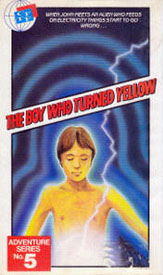| The Boy Who Turned Yellow | |
|---|---|
 video cover | |
| Directed by | Michael Powell |
| Written by | Emeric Pressburger |
| Produced by | Emeric Pressburger |
| Starring | Mark Dightam Robert Eddison Helen Weir Brian Worth |
| Cinematography | Christopher Challis |
| Edited by | Peter Boita |
| Music by | Patrick Gowers David Vorhaus |
Production companies | Roger Cherrill Ltd, Children's Film Foundation |
| Distributed by | Rank |
Release date |
|
Running time | 55 minutes |
| Country | United Kingdom |
| Language | English |
| Budget | slightly over £40,000 [1] |
The Boy Who Turned Yellow (1972) is the last film collaboration by the British filmmakers Michael Powell and Emeric Pressburger, and the last theatrical feature to be written by Emeric Pressburger or directed by Michael Powell. The film was made for the Children's Film Foundation.